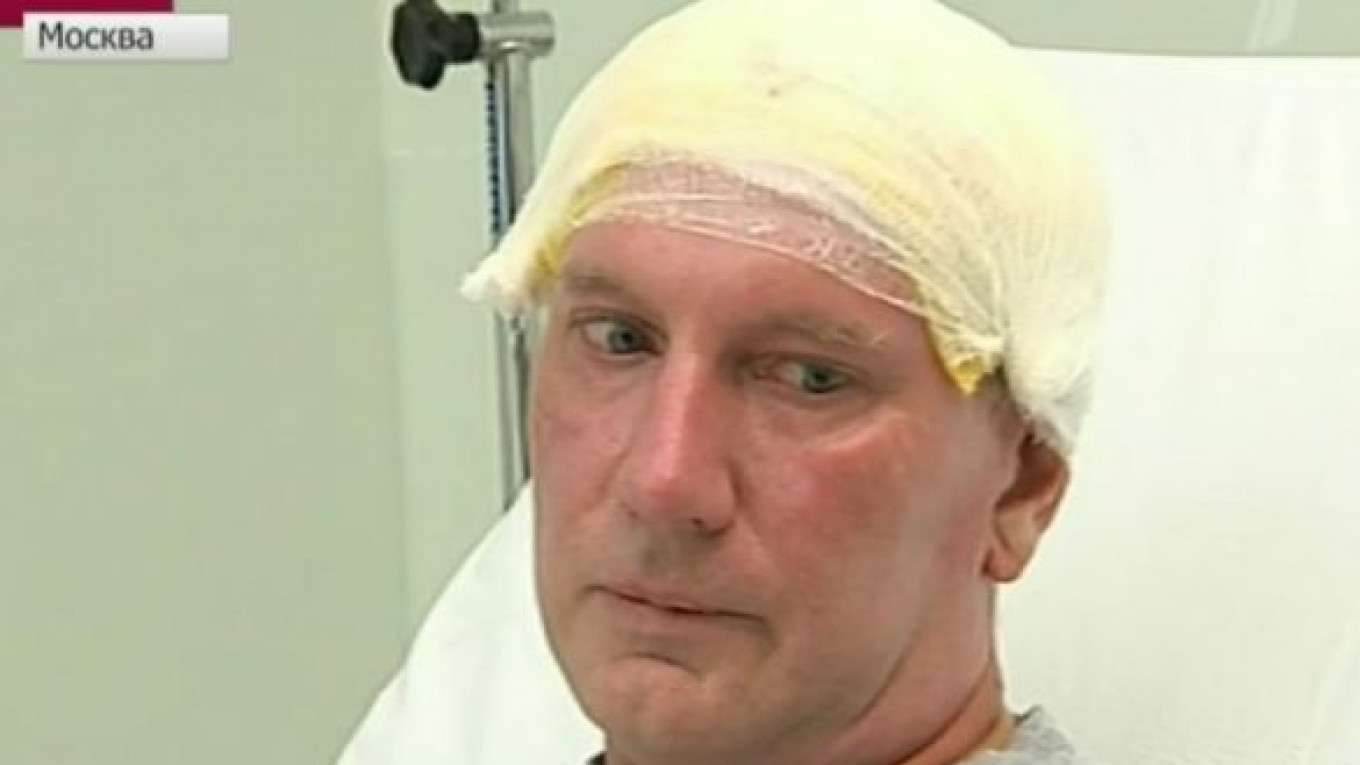The sole survivor of the plane crash that devastated Yaroslavl’s Lokomotiv ice hockey team last month said in his first public Thursday that passengers knew something was wrong before the Yak-42 took off.
Crew member Alexander Sizov, 52, told Channel One television that passengers started to worry when the plane did not lift off immediately.
“I quickly realized that we were on unpaved ground. The plane started falling shortly after takeoff, and it was clear that we were going to crash,” he said.
Sizov spoke from his hospital bed at the Sklifosovsky Medical Center, where he was brought two days after the Sept. 7 crash and treated for severe shock, burns and multiple fractures.
His head and hands bandaged, and hospital bed sheets up to his chest, Sizov showed few physical signs of the trauma he endured when the Yak-42 rose and then plowed into the ground — parts of it ending up in the Tunoshonka River, a small tributary of the Volga — and burst into flames.
But his measured tones, wandering eyes and weighty pauses suggest an inner struggle to reconcile himself with, among other things, his incredible good fortune: Of the 45 people on board the plane, Sizov was the only survivor.
“On impact, everything started flying. Something hit me hard, that’s why my left side is all busted up,” he said. “Once in the water, I honestly didn’t see or notice anything around — not the fires, not the plane, nothing.”
Police said an injured Sizov tried to save a colleague from the burning wreckage, an effort that left one of his arms severely burned.
Lokomotiv winger Alexander Galimov initially survived the crash but succumbed to his injuries five days later. The crash also claimed the lives of 19 Yaroslavl-born players and several foreign-born teammates, as well as Canadian coach Brad McCrimmon. The chartered plane was carrying the team to Minsk for its first game of the regular season.
Investigators are relying on Sizov’s account to help determine why the plane failed to reach the necessary speed during takeoff and why it ultimately fell from the sky after rising several meters.
Sizov said he was not sure whether the plane’s brakes had been engaged, as some have suggested. “If the pilot had slammed on the brakes, I would have felt it, but if he had engaged them slowly, I wouldn’t have,” he said.
He said the Yak-42 started to lose altitude before it nicked the navigation beacon, a revelation that likely rules out that collision as a cause for the crash.
Test pilot Vasily Sevastyanov told Channel One that a simulation of the flight this week indicated that the pilot pulled up too sharply before the plane had gained sufficient speed.
Sizov, an airplane mechanic, helped inspect the plane before takeoff and said it was in “ideal” condition. “I didn’t notice anything wrong,” he said, adding that the pre-flight check was routine and that the ground crew did not rush. Earlier reports misidentified Sizov as a flight attendant.
Sizov described the crew members as “good friends.” “For the past year, the crew and I had only flown on that plane,” he said.
Doctors plan to release Sizov in the coming days, Channel One said, though he still needs crutches to get around.
Once healthy, Sizov said he plans to return to his job as a mechanic. “I’ve given so much of myself to it,” he said, adding with a bittersweet smile that he might not fly anymore.
As for the question, “Why me?” he had this to say: “A kind of miracle saved me. My family and my wife’s love helped me survive.”
A Message from The Moscow Times:
Dear readers,
We are facing unprecedented challenges. Russia's Prosecutor General's Office has designated The Moscow Times as an "undesirable" organization, criminalizing our work and putting our staff at risk of prosecution. This follows our earlier unjust labeling as a "foreign agent."
These actions are direct attempts to silence independent journalism in Russia. The authorities claim our work "discredits the decisions of the Russian leadership." We see things differently: we strive to provide accurate, unbiased reporting on Russia.
We, the journalists of The Moscow Times, refuse to be silenced. But to continue our work, we need your help.
Your support, no matter how small, makes a world of difference. If you can, please support us monthly starting from just $2. It's quick to set up, and every contribution makes a significant impact.
By supporting The Moscow Times, you're defending open, independent journalism in the face of repression. Thank you for standing with us.
Remind me later.






